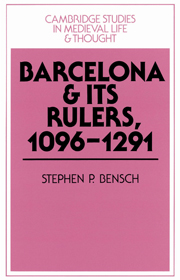Book contents
- Frontmatter
- Contents
- List of figures
- List of maps
- List of tables
- Preface
- List of abbreviations
- Introduction
- 1 The city and its region
- 2 The city and its lord
- 3 An aborted take-off: the urban economy in crisis, 1090–1140
- 4 Urban society in transition
- 5 The patriciate in gestation, 1140–1220
- 6 Family structure and the devolution of property
- 7 Consolidation and conflict: patrician power and Mediterranean expansion, 1220–1291
- 8 Patrician continuity and family identity
- Conclusion
- Appendix 1 Vicars of Barcelona
- Appendix 2 Bailiffs of Barcelona
- Appendix 3 Coinages and exchange values
- Appendix 4 Select documents
- Appendix 5 Select genealogies
- Bibliography
- Index
- Cambridge studies in medieval life and thought
7 - Consolidation and conflict: patrician power and Mediterranean expansion, 1220–1291
Published online by Cambridge University Press: 08 December 2009
- Frontmatter
- Contents
- List of figures
- List of maps
- List of tables
- Preface
- List of abbreviations
- Introduction
- 1 The city and its region
- 2 The city and its lord
- 3 An aborted take-off: the urban economy in crisis, 1090–1140
- 4 Urban society in transition
- 5 The patriciate in gestation, 1140–1220
- 6 Family structure and the devolution of property
- 7 Consolidation and conflict: patrician power and Mediterranean expansion, 1220–1291
- 8 Patrician continuity and family identity
- Conclusion
- Appendix 1 Vicars of Barcelona
- Appendix 2 Bailiffs of Barcelona
- Appendix 3 Coinages and exchange values
- Appendix 4 Select documents
- Appendix 5 Select genealogies
- Bibliography
- Index
- Cambridge studies in medieval life and thought
Summary
In late December, 1228, King Jaume I, now a tested and selfconfident ruler at age twenty, convoked a plenary court at Barcelona, where he confirmed the peace and truce throughout Catalonia and finalized his plans for the conquest of Majorca. After speeches from ecclesiastical dignitaries and barons, Pere Grony rose to address the assembly:
“My lord, we, the entire city of Barcelona, give thanks to God for the good fortune He has granted you, and we trust in Our Lord that you will accomplish what you set out to do. Let us be the first in offering you the galleys, ships, and boats which stand ready in Barcelona to serve you in this honorable host, for the honor of God. And we shall act in such a manner that we will forever earn your favor for the service we will now perform for you.”
I [King Jaume] did not wish to consult the other towns since none present carried greater weight than Barcelona. Tarragona and Tortosa agreed with the words that the prohoms of Barcelona had spoken.
As recounted in the king's own Book of Deeds, the speech by a patrician representing the entire populace of Barcelona concluded the deliberations of this fateful assembly, the planning committee for Catalan colonialism.
Ambiguities streak the seeming transparency of this offer of support. Besides revealing a probable lapse in the king's memory of the event since Pere Grony had in fact died a year before the gathering, the text presents a jumbled mixture of motives in explaining the city's rush to aid the venture: municipal pride, loyalty to the Crown, material and political self-interest, and the wish to serve God.
- Type
- Chapter
- Information
- Barcelona and its Rulers, 1096–1291 , pp. 277 - 346Publisher: Cambridge University PressPrint publication year: 1995



